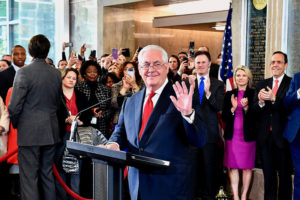
U.S. Secretary of State Rex Tillerson waves to employees before delivering farewell remarks at the U.S. Department of State in Washington, D.C. on March 22, 2018. [State Department photo/ Public Domain]
Some combined contempt for Tillerson with hope that things might get better. Dan Drezner of Tufts, who had called Tillerson an “unmitigated disaster at every facet of his job,” wondered whether his replacement, War Party favorite Mike Pompeo, might actually be better:
in some ways the choice…is between someone who is so incompetent that even if their foreign policy instincts might be correct, they were going to have no influence whatsoever, versus someone clearly much more hawkish, and therefore might pursue policies that are more reckless, but might be within the realm of sanity to the point where they can check Trump’s absolute worst impulses, and will actually—because Trump trusts them more—[he will] potentially listen to them more.
Put me down in the camp that thinks all of this arm’s length analysis is make-work for wonks. Nobody knows what Pompeo would do at State, much less how the Trump-Pompeo relationship is likely to go–including Mike Pompeo. The essential reason is that people continue to attribute independent agency to the people who work for Trump, when all of the evidence we have is that Trump listens to one person: Trump. So if you’d like to know what Pompeo is going to do at State, or how effective he will be, try to figure out what Trump is going to try to achieve. For all the garment-rending over Tillerson’s reign at State and glowing attributes to the prowess of the sadly-neglected foreign service, no amount of conniving was going, for example, to convince the Europeans to tear up the Iran deal and start over. No matter who was in charge.
For me, the more interesting aspect of the Tillerson epitaph is his identity as a patrician WASP statesman. The Republican Party’s foreign policy establishment used to be run by people who looked an awful lot like Tillerson on paper: businessmen and lawyers, with some politicos and academics, mostly drawn from elite schools and old money, who mostly preferred technocracy and Getting Things Done to ideological flights of fancy.
People like Christian Herter, George Shultz, Brent Scowcroft, James Baker, and the elder George Bush. Tillerson was that type of guy. As Politico’s Susan Glasser described him, Tillerson was an “old-school realist and real-life Boy Scout who thought he could conduct the sort of pragmatic, by-the-books diplomacy that had worked in putting together oil deals.”
I suspect that Rex Tillerson is the last of this sort of Republican appointee. I cannot name any younger than him waiting in the wings. This is likely to have big implications for foreign policy in the coming decades.
It is important first and foremost because any restraint-inclined, or even technocratic, Republican president in the future will not have a deep bench of such people to draw on. One of the great failings of the Scowcroft/Baker generation was their inability or unwillingness to cultivate a successor generation.
That generation all but left the party to the tender mercies of the neoconservatives, who engaged in an admirably focused, decades-long Weberian project of establishing a foreign-policy counterestablishment that could successfully assimilate into and eventually become the GOP foreign policy establishment.
Interestingly, though, if a new generation of realists is to rise and challenge the predominance of the neocons in GOP foreign policy, it will not be oil men or old money WASPs but a motley group with ties to the academic security studies establishment.
From universities like MIT, the University of Chicago, and Notre Dame, a generation of international relations academics have been turning out policy-minded scholars since at least 1993. Many of these are policy-focused professors, writing on grand strategy, proliferation, and regional security issues. They maintain a focus on policy, unlike the majority of IR academics, and are therefore versed both in scholarship and in policy.
A number of these scholars have expressed interest in policy, and with the recent influx of money and interest from the Charles Koch Institute and elsewhere, there is reason to hope that a counterestablishment could be built over the next couple of decades. When there might be demand for such a group is unclear, but if it does not exist in the first place, it can never answer the call.
With the Tillersons of the world on the way out, and the prospect of a new generation in the offing, we are left with a new subject to worry about at present, and the topic of next week’s column: Bolton, Pompeo, and the emerging makeup of Trump’s inner circle on national security.





